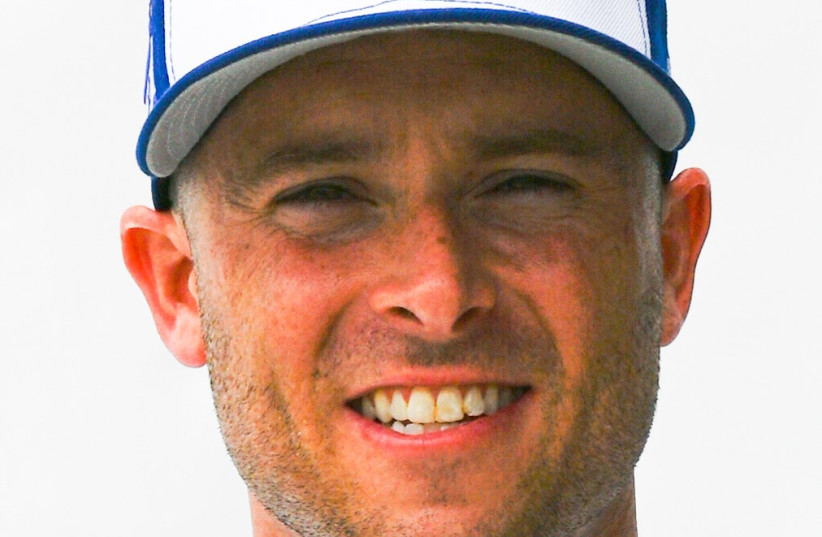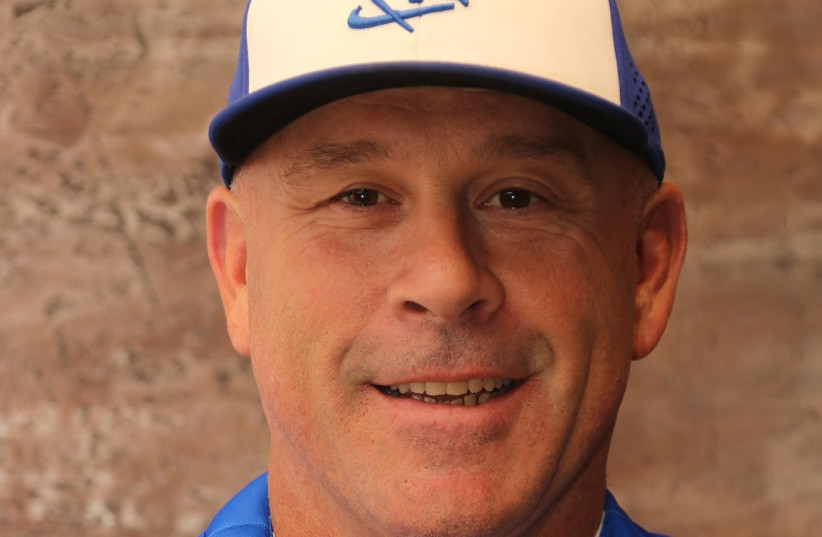TOKYO – Israel’s Olympic baseball team won the hearts of a nation this week in Tokyo.
Despite bowing out of the Olympics without a medal after posting a 1-4 record, the blue-and-white squad consisting of American Jewish Olim who have made aliyah routed world No. 5 Mexico and were just three outs away from reaching the medal round on Wednesday with a near-upset of seventh-ranked Dominican Republic.
“We played our hearts out, and we showed the world Israel can play ball,” catcher Ryan Lavarnway told The Jerusalem Post. “We proved we could have beaten any team on any day. So, we’re disappointed but also very proud. We’re going home with our heads held high.
“We also had third-ranked [and reigning Olympic gold medalist] Korea on the ropes in the opener,” he added. “We should have won, and we easily could have ended up going 3-2 for the tournament, on our way to playing for the gold.”
Four-time All-Star Ian Kinsler, who’s no stranger to big games and, like Lavarnway, has a World Series ring to prove it, reflected on what it meant to be an Olympian. “This doesn’t compare with anything. It’s different. The high intensity you feel in every single game, where every at bat, every pitch means so much – nothing compares with it!
“We’re here representing the country, our family heritage. People were watching and were inspired. I’d love to build on this and help build more fields so kids in Israel can get out there and share the love of the game and feel the joy of playing.”
Former Major Leaguer Danny Valencia was animated as he spoke about the bonding among teammates. “It was awesome to be part of this experience: laughing with the guys, playing cards and getting to know the young Sabra players, being a role model for them so they could improve professionally.
“My social media is exploding with people from Israel and around the world who became excited by what we’re doing and who want to be a part of it. We have a slogan, ‘Be the 25th man,’ which allows everyone to feel part of our team. I’ll never forget this.”

For Valencia, like Kinsler, this will probably be the last time he laces up his cleats competitively. He takes tremendous pride in performing at the highest level, which he did once again this week. In Tokyo he played in five games and hit three dingers, every one of them coming during a crucial at bat.
“When you do that,” he told the Post, “it energizes your teammates, especially the younger guys, and gains the respect of the other teams.”
CATCHER TAL EREL is one of these younger Sabras who seized every opportunity to learn from his elders, especially from Lavarnway and Nick Rickles, who are both a joy to watch behind the plate.
“Regarding the Olympic experience, he said, “It’s not easy to lose – especially such heartbreaking defeats – but if one must fall, at least it should be as part of such a great team. We showed what we can do as a country. I hope that this will help me so that in future tournaments, I can lead others and share my experience with them.”
Assaf Lowengart was the youngest player on the team. Like Erel, he grew up playing baseball locally, attended the Israel Association of Baseball’s academy, and represented Israeli teams in international competition before doing his army service. He was awed by the opportunity to play alongside, and even serve as a defensive replacement for baseball icons like Kinsler.
Lowengart made the most of every opportunity, getting into three of the five games, making several good plays in the field, and even swinging a bat in Olympic competition.
“For me to sit and learn from these legends, and then go out and do it in a real game – it’s hard to express my emotions. But what really did it for me was seeing Shlomo Lipetz take the mound. Shlomo is the dean of all Israeli ballplayers, who has represented the country since his days in youth ball until now when he’s in his forties. My heart was riding on every pitch and rejoiced with every out he recorded.”
General manager Peter Kurz, took special pleasure in seeing the interaction between Israel’s young players and men nearing the end of their playing days. It is all part of the vision he has for Israeli baseball.
“Ten years ago I said Israel would play in the WBC. We dared dream,” said Kurz. “Five years ago, ESPN laughed at us and called us “the Jamaican bobsled team of baseball.” We went ahead to beat Korea on their home turf in 2017 and ended up in 6th place.”
Kurz took the team to a new level by bringing on Eric Holtz as manager.
“When I told him about the idea of going to the Olympics, Eric told me ‘You’re dreaming – but I’m in.’ So as Herzl said, dreams are good.”
Kurz said that he hopes the younger players will overcome their disappointment at failing to win a medal and use the experience as a stepping-stone in their baseball careers.
David “D.J.” Sharabi is one of them. At 29, the quiet, kashrut-observing young man approaches his work without fanfare. He was distraught when the one-out ground ball he induced during Israel’s last inning of Olympic play failed to produce the desired outcome; or when, facing the next batter, the umpire missed the call of an inning-ending third strike, allowing Jose Bautista a second life to give the Dominicans a walk-off single on the next pitch.
Josh Zeid who came through with three quality performances, giving Israel a chance to win in each game, didn’t want to think about the future just yet.
Others, like Florida Marlins AAA pitcher Jake Fishman, were heartbroken. “Fish” called the Olympic journey “the most amazing experience in my life. Not just the Olympics but the whole process of becoming [an Israeli] citizen.”
Perhaps the greatest testimony to camaraderie that developed among the players came after only nine pitches of Olympic play.
Starter Jon Moscot, who had methodically worked his way back to top form, blew his elbow out throwing a 90-plus mph fastball. One practice pitch later Moscot knew his game – and his career – were over. He was beside himself feeling that, as Israel’s true ace, who had planned to go deep into games, he had let his teammates down.
His teammates tried to commiserate with Moscot, saying he should return home a week early to be with his wife, who was due to give birth this Friday. After consulting with his wife, Jon choose instead to stand by his comrades, rooting them on during their battles.
He views what Team Israel has accomplished as “magical – and not just for the Jewish state but a wider context of peoplehood.”
Moscot deeply believes that this experience will have an impact on American Jews, who will be a bit more proud of who they are because of baseball.
The bond between Jews is a pillar of Moscot’s belief system. He feels strongly connected to his uncle Herbie from Efrat as well as Herbie’s children and grandchildren, who cover Israel geographically: one lives in the South, one serves in the IDF in the center of the country, and another in the North.
Kinsler summed up the experience, describing the joy he felt traveling with team, not only in Japan but during the two-week training camp that preceded the Olympics in which Team Israel came together as a unit.
“What an incredible journey! We traveled on a bus just like in old-fashioned barnstorming days, going up and down the northeast US. We played exhibition games in places like Hartford, Connecticut; Lancaster and Harrisburg, Pennsylvania; Aberdeen and Bethesda, Maryland.”
From there, all the way to Tokyo, the Israel baseball team made history, win or lose.

The fan in the stands
It’s has been a long journey for me, covering the Israel baseball team over these last few years.
I began by helping Peter Kurz with whatever he needed to be done, whether helping players to navigate through the aliyah bureaucracy, providing opportunities for these incredible men to explore their heritage, or raising a few shekels.
I started covering the games for The Jerusalem Post beginning in 2016 with the WBC qualifier in Brooklyn and through the 2019 qualifier in Italy. I came to feel part of the mishpaha amid devoted family members who schlepped from all over to root for their husbands/sons/ brothers and daughters.
Over two years ago, the Post applied for Olympic accreditation in order to send me to the Tokyo games. As the phrase from Psalms goes, “God watches over fools.” Without this accreditation, I would not have been permitted to enter Japan.
In Tokyo, I was witnessed the intricate system of rules and procedures as well as logistics that the Japanese developed which allowed the games to be played safely despite the ever-present threat of Covid.
I have had to interview players at a distance, but have been close with them all. It has been surreal to sit in Yokahama’s cavernous 34,000-seat stadium by myself, giving rise to the team’s new mascot. Whereas the 2017 WBC team had its “Mensch on a Bench,” the Tokyo 2020 team had “the Fan in the Stands.”
The Israeli Olympic delegation included 17 members of the press and National Olympic Committee members (such as Yael Arad) and Sport Ministry figures, who traveled over an hour each way and sat in 35-degree heat but stayed riveted to every pitch. They asked questions non-stop, eager to learn the game. Following Team Israel’s respectable showing, there will be ample opportunities for that. - D.G.
